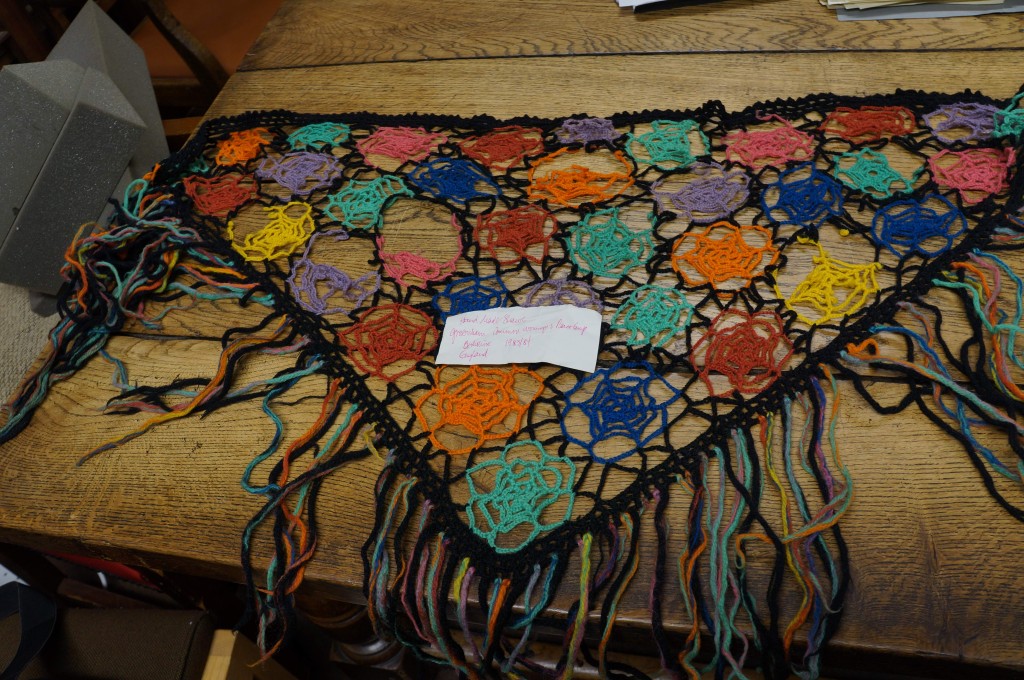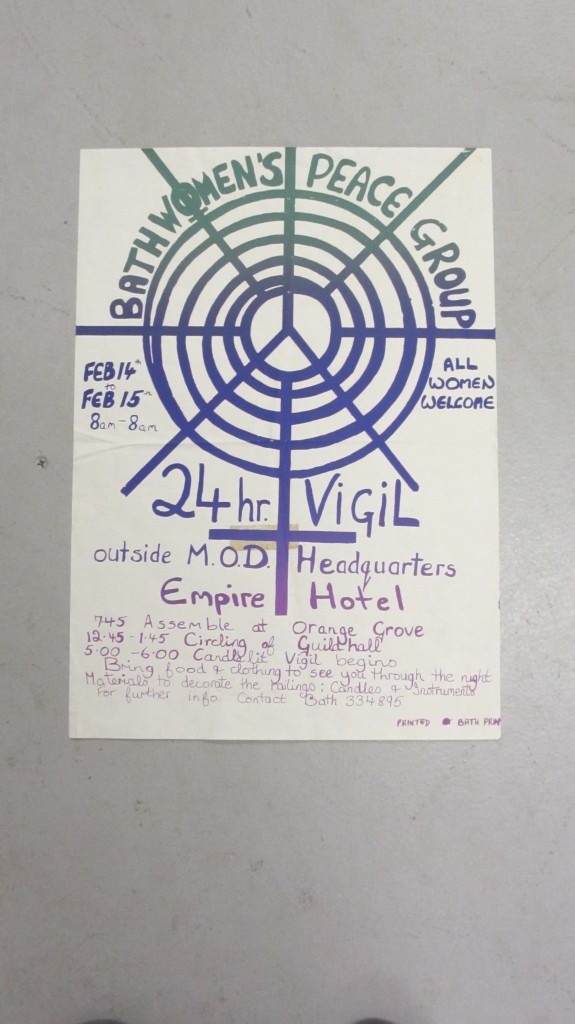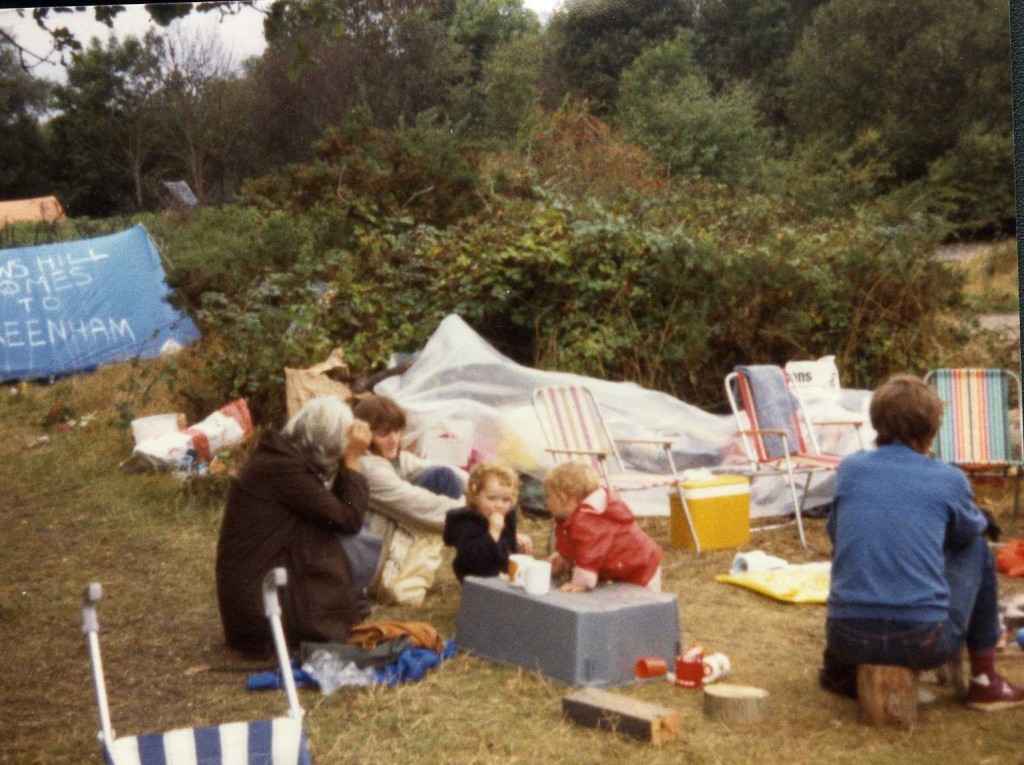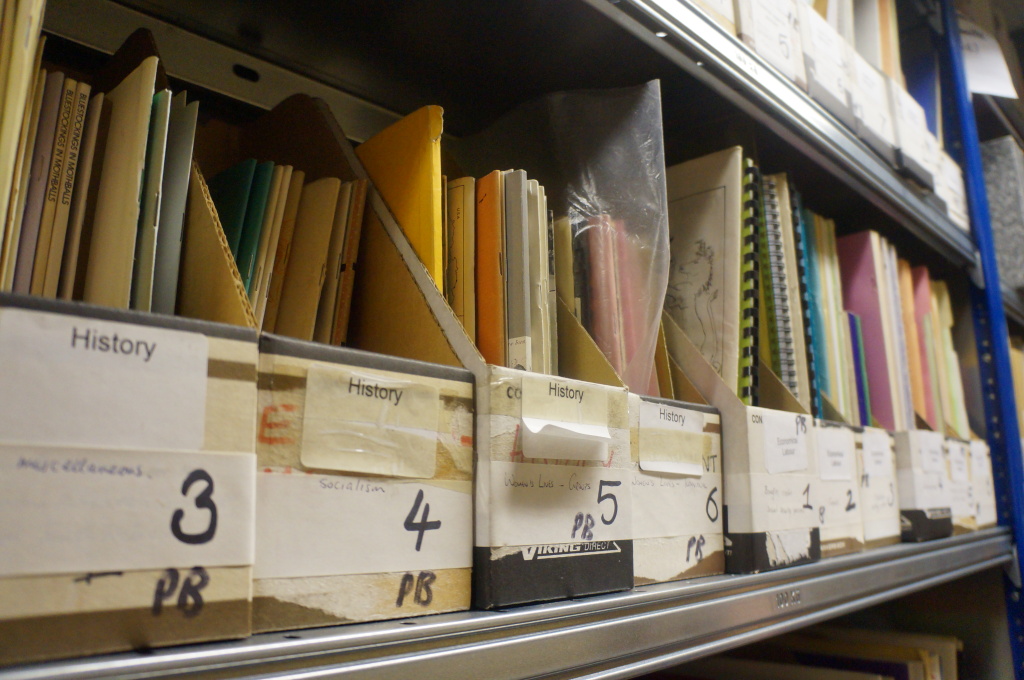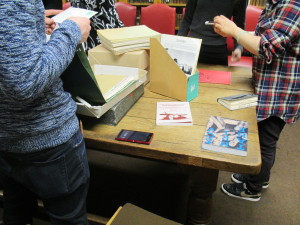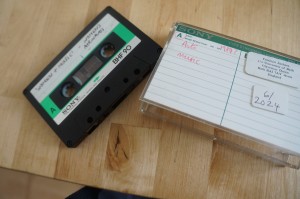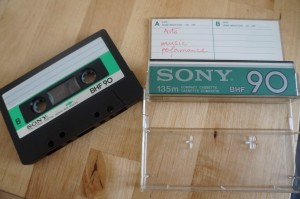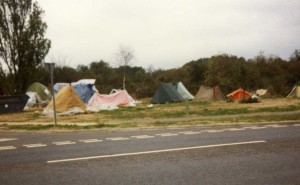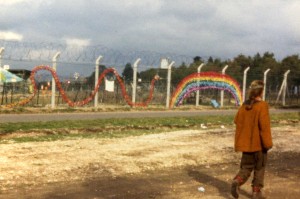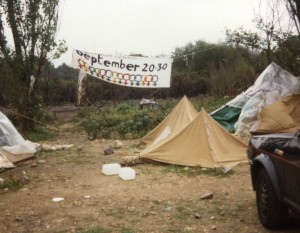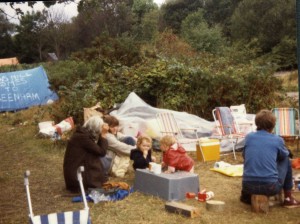The post Moving Targets – Feminist Archive South at Arnolfini this Summer! appeared first on Feminist Archive South.
]]>Moving Targets will ‘draw on Bristol’s independent spirit and explore punk as an attitude that has more than one history and meaning.’
The exhibition title is taken from and dedicated to Mimi Thi Nguyen and Golnar Nikpour’s chapbook ‘Punk is a Moving Target’.
Our material will be displayed in the galleries from 8 August-11 September.
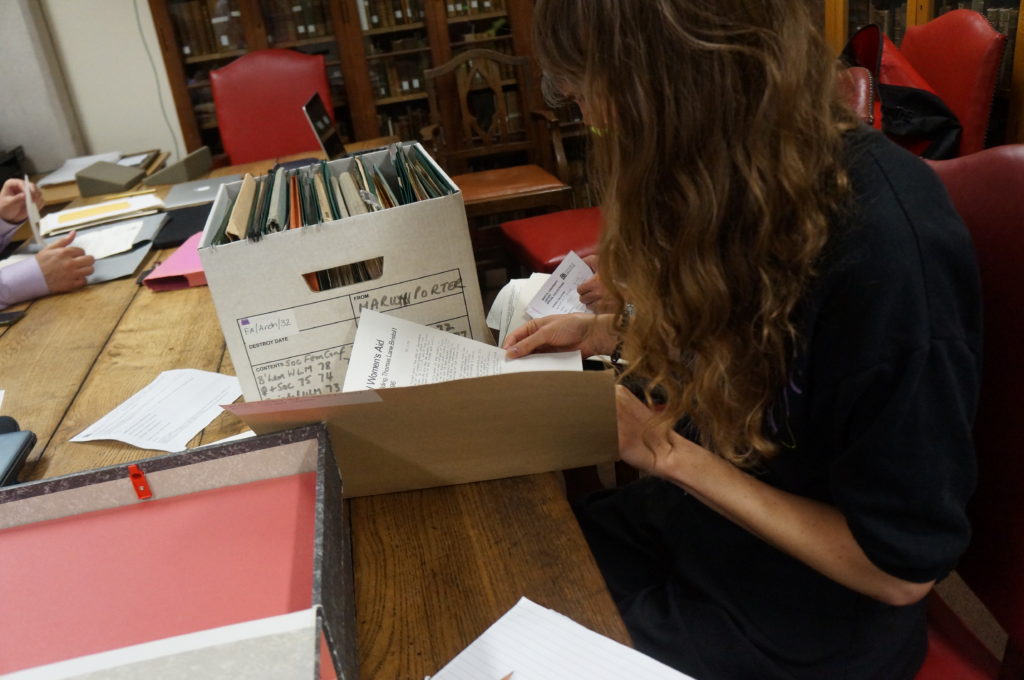
The exhibition and accompanying event programme offer a much needed counterpoint to white, western and male dominated narratives of punk history.
These one-dimensional stories continue to be perpetuated, even in 2016.
Viv Albertine, who you should know as a member of the Slits, recently defaced storyboards at the British Library’s punk exhibition in order to re-insert ground-breaking female acts that were excluded from the exhibition.
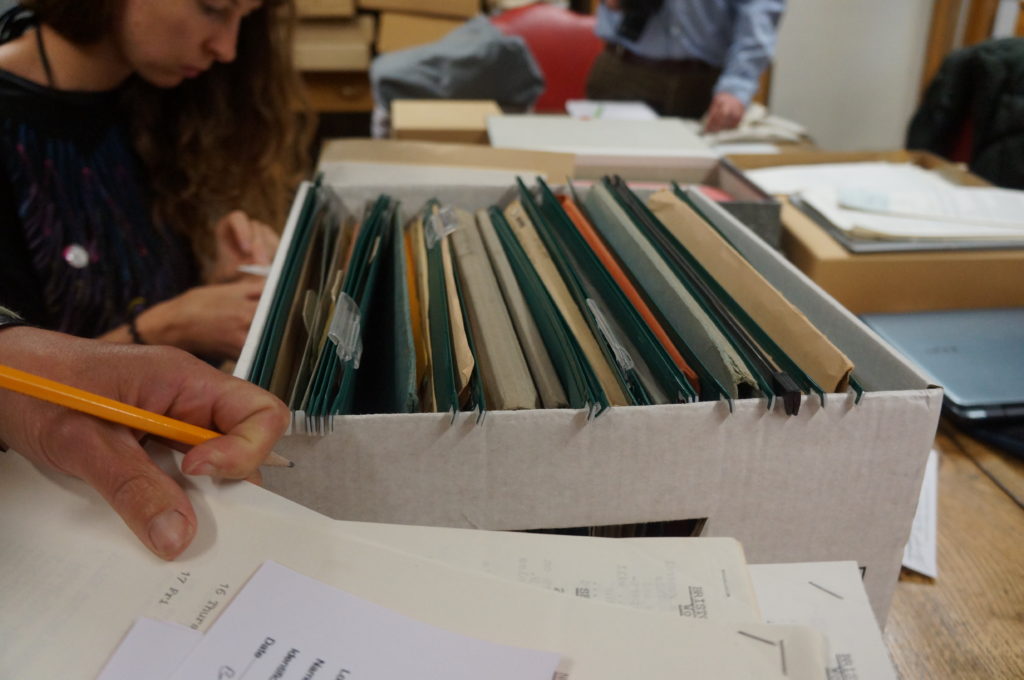
Materials displayed from our collection include Bristol WLM newsletters, fliers, badges and anarcha-feminism/ punk ephemera.
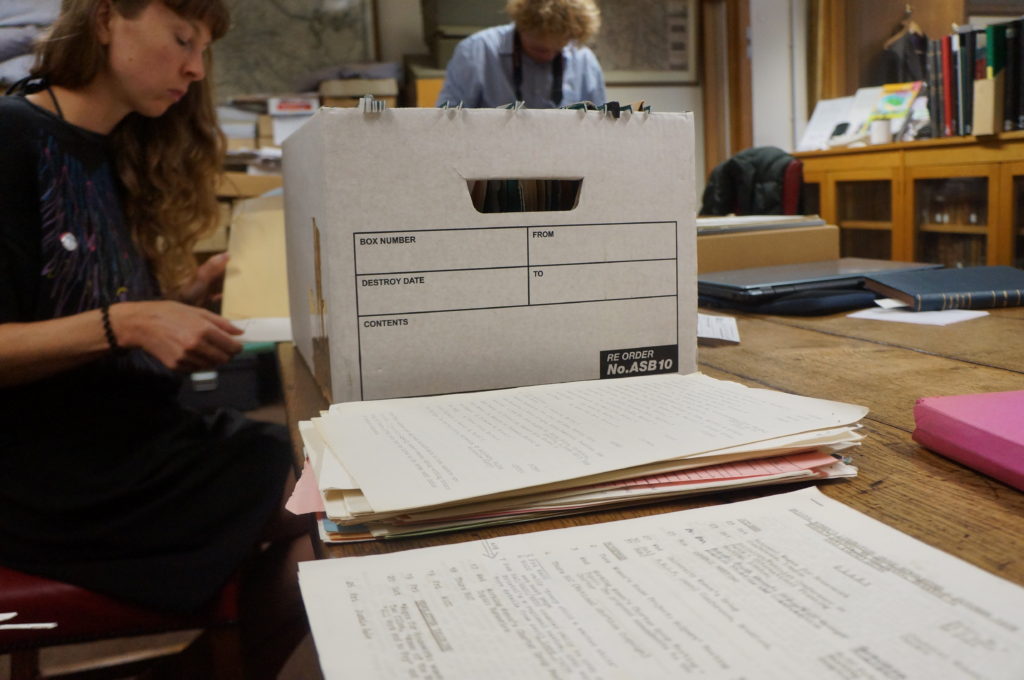
We hope our presence at Moving Targets will help raise awareness about the Feminist Archive South, and encourage more people to visit us in the future.
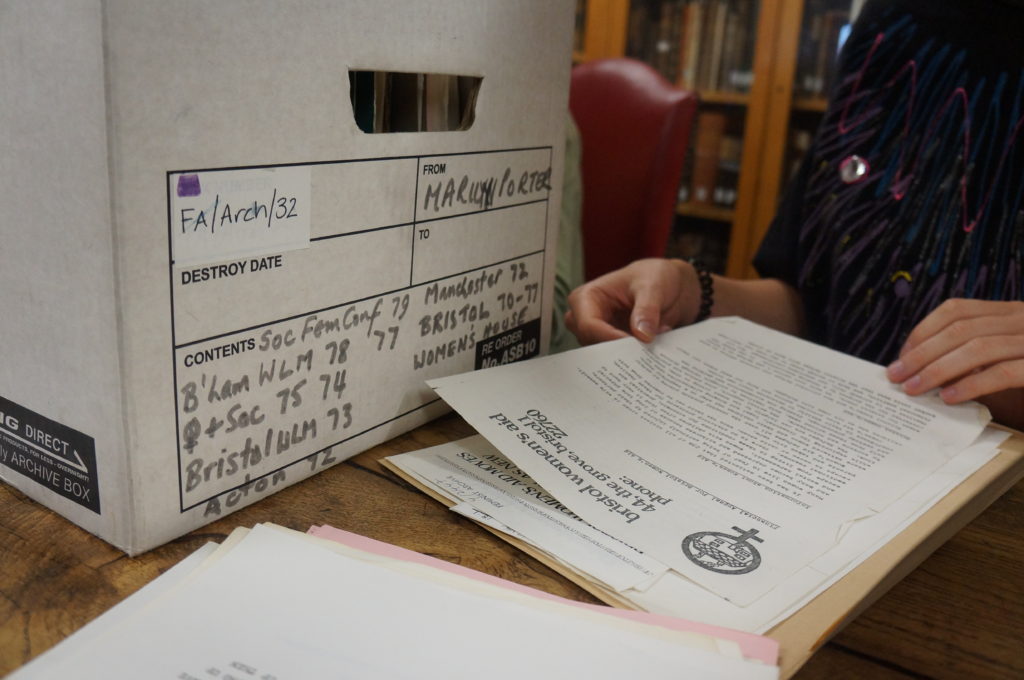
For now, enjoy these images of us rooting through the collections!
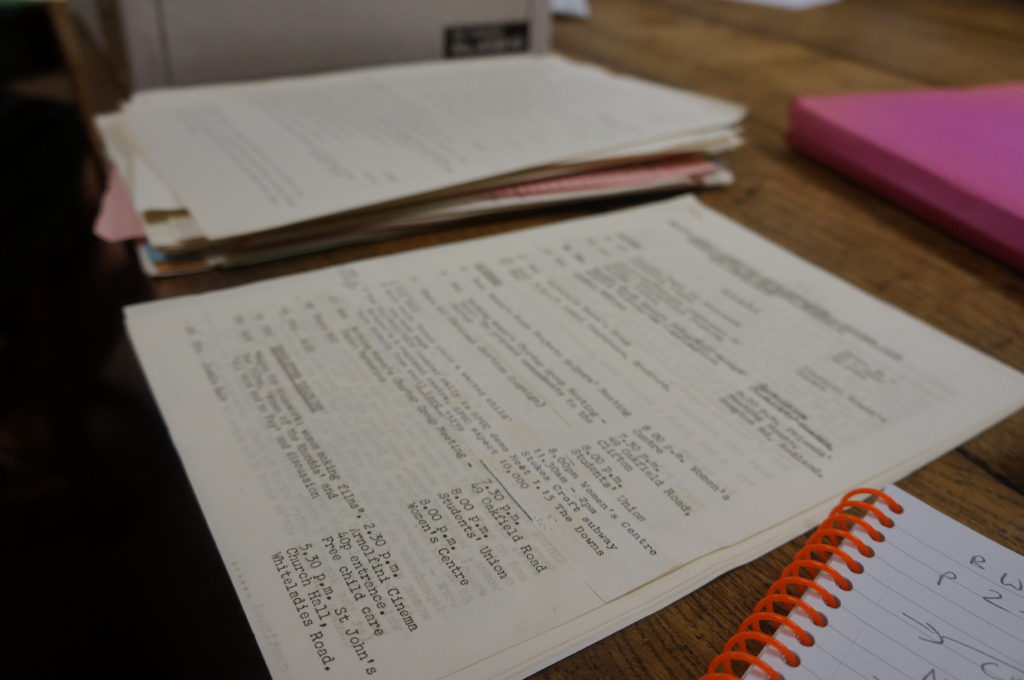
The post Moving Targets – Feminist Archive South at Arnolfini this Summer! appeared first on Feminist Archive South.
]]>The post Alison Bartlett – Researching the International Feminist Peace Movement appeared first on Feminist Archive South.
]]>In the spirit of Greenham activism, she ‘widened the (feminist archive) web’ to collections relating to the feminist peace movement in Australia.
Enjoy!
***
As an Australian researcher interested in feminist cultural histories, the Feminist Archives South is one of the main reasons I applied for a Benjamin Meaker Visiting Professor position at Bristol University. My research into the 1980s women’s peace movement and especially the two women’s peace camps held in Australia has always been in relation to Greenham Common women’s peace camp. The opportunity to sift through the rich archives of this iconic feminist event is a rare treat.
At the same time, I’ve been reading Kate Eichhorn’s book The Archival Turn in Feminism: Outrage in Order (2013) which proposes that the growing interest by feminists to delve into archives is to make sense of the ‘legacies, epistemes, and traumas pressing down on the present’. Eichhorn argues that neoliberalism of the late twentieth century has not only individualized our capacities as subjects but eroded our sense of collective agency, something that archives like the Feminist Archive South restores. Rather than understanding archives as nostalgia for the past, she claims archives reorient our understanding of the past and therefore enable us to reimagine our present.
The boxes of material on Greenham Common are full of letters, flyers, newspaper clippings, court documents, photographs, stickers, postcards, and even a multicoloured spiderweb shawl and a piece of the green military fence tied with webs of string. I read with astonishment that some Greenham women took US President Ronald Reagan to court in New York over the deployment of nuclear missiles onto English common land. And the letters sent to women arrested and sent to Holloways prison are particularly poignant.
The ferocity of their belief in the necessity to stop escalating military interventions and nuclear arms is inspiring, and it’s easy to see how it motivated a worldwide movement of women protesting war and militarization. Together with the women’s movement, the women’s peace movement formed a significant set of arguments about the continuum of male violence, and women’s agency to imagine other ways of living, loving, and doing civilian politics.
My research into the 1980s women’s peace camps in Australia indicates that they were a direct response to what was happening in Berkshire. They were conceived as support actions but also to bring attention to the particularities of the US military in Australia. The first camp was held in central Australia outside the US military base at Pine Gap in December 1983, coinciding with the day the Cruise Missiles arrived at Greenham. The second camp was held a year later in 1984 at Cockburn Sound on the west coast near Fremantle, a major port into which US naval vessels docked and sailors took their rest and recreation.
Unlike at Greenham Common, an umbrella organization was formed specifically to coordinate the peace camps in Australia, bringing together a coalition of women’s organisations, peace, and anti-nuclear groups. The archives are largely filed under the name of the group: Women For Survival. There are substantial collections at the Jessie Street National Women’s Library in Sydney, and the University of Melbourne Archives in Melbourne which holds the Victorian Women’s Liberation and Lesbian Feminist Archives. But almost every State Library and many university libraries around Australia also hold some material. The Murdoch University Special Collections in Perth holds material in the Gay and Lesbian Archives of Western Australia (GALAWA) collection; and in Adelaide the State Library of South Australia now holds some of the dispersed resources from the Adelaide Women’s Liberation Archive; the State Library of Victoria in Melbourne; and the Fryer Library at the University of Queensland in Brisbane hold material. There are some badges displayed at the Museum of Australian Democracy in Canberra where you can also hear questions in Parliament being played on rotation, and there’s a student film made at the Pine Gap camp available at the National Film, Television and Radio School online. The Northern Territory Archives Service in Alice Springs has a great collection of oral history interviews.
There was a traffic of ideas, people, rituals, telegrams, letters, songs, and even parts of the military mesh fences between Greenham and the Australian peace camps. There are traces of this in the Australian archives and in the Feminist Archives South. Zohl de Ishtar stands out as a regular writer for the Greenham Newsletter, campaigning relentlessly to raise the profile of colonized and militarized Pacific nations, especially those used as nuclear testing sites from the 1950s. But it’s the thousands and thousands of women who went to Greenham for a day or a week or a year who register the impact of collective action, and whose traces in the archives demonstrate the mass attraction of arguments for de-militarisation amidst the threat of nuclear war during the Cold War period. I can’t imagine how 30 000 turned up on December 12, 1982 to hold hands around the entire 9 mile perimeter of the US Air Base at Greenham to ‘embrace the base’.
Eichhorn argues that archives themselves are forms of activism, as are archivists. The Feminist Archives South certainly demonstrate the value of feminist archives, and remind us of the possibilities for changing our worlds through collective action.
***
We welcome all our readers to write about their experiences researching in the Feminist Archive South. It helps us to understand how people engage with our collections, and communicate our holdings to wider audiences.
If you have a FAS story you want to share with readers of this blog, please send it to us (no more than 1000 words).
Many thanks to Alison for taking time to write up her visit!
The post Alison Bartlett – Researching the International Feminist Peace Movement appeared first on Feminist Archive South.
]]>The post Volunteer opportunities in the Feminist Archive South appeared first on Feminist Archive South.
]]>We need some kind volunteers to help with typing up word lists, access databases, and other random listings, which can converted into one catalogue, so people both in Bristol and elsewhere, can easily evaluate what is in the archive, and order up resources to use. At the moment, a significant amount of our lists are on paper alone.
Ensuring the archive is catalogued really helps researchers, and members of feminist communities, discover the Feminist Archive South’s contents. It also helps to preserve material in the long run (because of less handling and we are able to access materials from store in a more precise way).
Bear in mind everything won’t be catalogued at the end of this project, but if you would like to get involved it would really help us.
We envisage people will be taking printed or photocopied lists and typing them up and converting them into another format. It can be done in Special Collections, or we can supply copies of lists for you to work on at home. We will provide a template for you to fill, which should be easy to use and follow.
You don’t have to have any prior experience of archive work, just be keen to learn about feminist histories and have a good eye for detail.
Do get in touch and we are happy to discuss this further.
There is no deadline, as we envisage this kind of support will be ongoing for the immediate future.
The post Volunteer opportunities in the Feminist Archive South appeared first on Feminist Archive South.
]]>The post News from the archive appeared first on Feminist Archive South.
]]>‘Although the blog has been quiet recently and there are less researchers using FAS at the moment, today we hosted a workshop with Maud Perrier and 16 of her University of Bristol postgraduates.
Although the Special Collections Reading Room was rather chilly, there was a real buzz with discussions of Greenham Common, Carole Harwood, Wages for Housework, and other topics.
Maud and I commented on how cold it must have been living at Greenham Common, and on how dedicated the women must have been.
Although the majority of the Feminist Archive South is held off site in the University of Bristol Library Research Reserve, it is available for use.
Use the catalogue to get an idea of the holdings and get in touch to see if we can help with your research.’
What are you waiting for? Our amazing collection awaits you….
The post News from the archive appeared first on Feminist Archive South.
]]>The post Women’s Liberation Music Archive – catalogued and available for use appeared first on Feminist Archive South.
]]>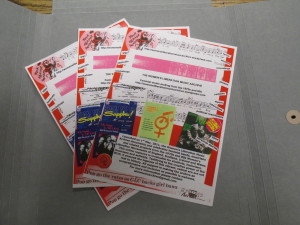 The Women’s Liberation Music Archive is now available for consultation in the University of Bristol Special Collections, and is stored with the Feminist Archive South.
The Women’s Liberation Music Archive is now available for consultation in the University of Bristol Special Collections, and is stored with the Feminist Archive South.
It has the reference DM2598 and contents can be viewed on our online catalogue.
It consists of 7 boxes of materials relating to Music and the Women’s Movement in the 1970s and 1980s.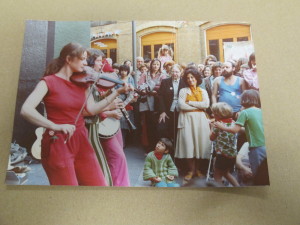
Gems include audio and audiovisual recordings of bands such as Clapperclaw, Jam Today, Ova, the Fabulous Dirt Sisters, Feminist Improvising Group, Frankie Armstrong, The Mistakes, Guest Stars, and Contradictions, as well as a range of fascinating ephemera including fliers, diaries, budget books, manifestos, songbooks, posters, oral histories and much more.
Listening and viewing facilities are available within the archive for this material.
Big thanks to Sarah Cuthill who catalogued the material for us.
The post Women’s Liberation Music Archive – catalogued and available for use appeared first on Feminist Archive South.
]]>The post Student visits to the archive appeared first on Feminist Archive South.
]]>In March 2014 we held four workshops when we hosted all of the first year University of the West of England design students (around 80 in total).
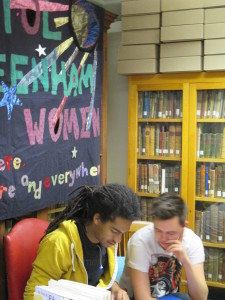
They were inspired by the collection to create their own pieces of work, and a fascinating time was had by all involved, students and staff alike. Discussions took place on Greenham Common, Miss World (and alternatives to Miss World), Sistershow, relationships, art work, 1950s central Europe, and everything else!
The post Student visits to the archive appeared first on Feminist Archive South.
]]>The post Women’s Radio Workshop – Women and Music appeared first on Feminist Archive South.
]]>The Women’s Radio Workshop programme ‘Women and Music’ provides a rare and unique insight into women’s liberation music making.
The programme features ‘seven women who play and write music’ including Rosemary Schonfeld, Jana Runnalls (Ova), Andrea Webb, Janie Webb, Judya Manthis (sp?), Lawrie Strike, Louise Marsden, Rosie Fisher and Sarah Gillam.
For more background on music making and the WLM visit the online Women’s Liberation Music Archive, in particular read the introduction to the Sisters in Song book. The physical WLMA has been deposited in the FAS and is in the process of being catalogued – check back soon for updates on this!
For now, enjoy!
The post Women’s Radio Workshop – Women and Music appeared first on Feminist Archive South.
]]>The post New Additions to the Greenham Common Collection – The story of Mrs. Jocelyn Wood appeared first on Feminist Archive South.
]]>We were recently contacted by Michael Wood, the son of Mrs. Jocelyn Wood, who sadly recently passed away, to see if we would be interested in housing a piece of the Greenham Common fence and some photographs of the camp. Of course we said yes!
An email from Michael is included below to introduce his mother’s text, which outlines her memories of being stationed at Greenham Common during the Second World War, years before she returned to Greenham as an activist.
A big thankyou to Michael for letting us post this story on the website, along with the photos. If you want to view the items in the flesh, they bear the catalogue number DM2123/1/Archive Boxes 129.
‘Hello
My wife has recently contacted you about a piece of fence from Greenham Common from my mother (Jocelyne Wood, nee Withycombe) – correspondence below. We think she has some photos as well which we will try to dig out and send them together.
She did write a few notes about her life – nothing about going to Greenham during the seventies (?) but she was stationed there for a few months during the war until the Americans arrived – see attachment.
We’ll be in touch again when we’ve found the photos.
Best wishes
Michael (Wood)’
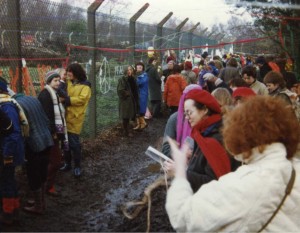 RAF Greenham Common was like a holiday camp after Hednesford, I spent three very enjoyable summer months there July to August 1943, WAAFs were billeted in a large house with a garden stretching down to the Kennet, a fast flowing chalk stream, It was ideal bathing, We were working outside doing daily inspections on Oxfords, which in good summer weather was pleasant work.
RAF Greenham Common was like a holiday camp after Hednesford, I spent three very enjoyable summer months there July to August 1943, WAAFs were billeted in a large house with a garden stretching down to the Kennet, a fast flowing chalk stream, It was ideal bathing, We were working outside doing daily inspections on Oxfords, which in good summer weather was pleasant work.
We did the same jobs as the RAF – for which as far as I can remember we got half the pay, NCOs were all RAF and most had served RAF apprenticeships.
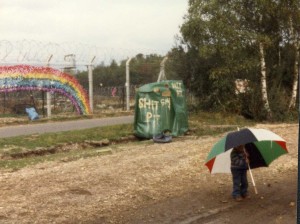 Greenham was a Training Command station. WAAF mechanics were never sent to active service stations – a fact you were not told when you joined up. Our Greenham was very different from the USAF cruise missile base, The main Basingstoke road, now diverted, ran through the camp. As far as I can remember there were no fences even round the runway. It trained for night flying so there must have been some way of stopping traffic when flying was in progress.
Greenham was a Training Command station. WAAF mechanics were never sent to active service stations – a fact you were not told when you joined up. Our Greenham was very different from the USAF cruise missile base, The main Basingstoke road, now diverted, ran through the camp. As far as I can remember there were no fences even round the runway. It trained for night flying so there must have been some way of stopping traffic when flying was in progress.
Hitching to Fleet from Greenham was easy usually only taking about an hour, so I went home a lot – sometimes just for a half day.
The road to Basingstoke was beautiful with wild clematis and scabious. I had my cycle with me as did most of the others. A favourite evening ride was to Kingsclere where there was a good YM canteen in a magnificent barn. (I have since tried without success to identify that barn.)
The Services’ canteens and hostels were very useful, There were hostels in most major towns which I made much use of on my hitching expeditions. London ones were particularly useful making theatre visits possible, A uniform opened many doors. Looking back it seems very unfair. Girls conscripted to factories like ROF Chorley worked much harder and for longer hours than we did, were away from home living inferior hostels with inferior food but had no such facilities, nor did the Land Army.
For other entertainment there was Newbury and the Americans, There were several US bases nearby that invited us to dances, The main attraction was the food rather than the G.I.s most of whom were boring. There were WO exceptions, I got to know David McGeon because I happened to tell him I was reading War & Peace. I went out with him several times. He was a film script writer and was fairly left wing. He was interesting, but too introspective to be easy company, Then Stan Sobolewski took over. I met him at a dance at the Corn Exchange in Newbury from where we walked through the park by the river orchestrated by thunder and lightning – but no rain.
I saw a lot him during the next two weeks. He was tall, dark and handsome and very attractive, but not political. He was of Polish origin and came from Detroit, Two weeks later the blow fell: the Americans were taking Greenham over and the RAF had to move. Stan and I corresponded for several months and met once in London, but the magic had gone. I had had a lucky escape.
The news of the move was devastating to everyone. We all liked Greenham. We had one week’s notice. A special train was provided for the move. The whole station packed up and moved. Our destination was Long Newnton, Glos. It was an unattractive camp and the nearest town, Tetbury, was no compensation for Newbury in spite of its lovely old buildings. I was there less than a week before I was posted yet again – to the Fitters’ Course at Halton.
The post New Additions to the Greenham Common Collection – The story of Mrs. Jocelyn Wood appeared first on Feminist Archive South.
]]>The post Archiving in a born digital era appeared first on Feminist Archive South.
]]>The post Archiving in a born digital era appeared first on Feminist Archive South.
]]>The post Sheba Press & worries about link rot appeared first on Feminist Archive South.
]]>So when conducting research about Sheba Feminist Press, who published the important Black British feminist text Charting the Journey in 1988 and many others, it was a relief to find some information about them.
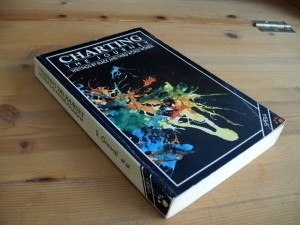
What was slightly disconcerting was the nature of the web page, which appeared graphically old and was hosted by a US university site. It wasn’t being actively maintained and was the kind of link, you suspect, that would soon disappear.
In short, this is the rationale for reproducing the text below in its entirety from that web page in case it breaks, or vanishes.
For further information, the Women’s Library in London was donated records from Sheba Press (1980-1994) in 1995, but it remains uncatalogued and unaccessible to researchers.
Now there’s a funding bid that needs to happen!
ABOUT SHEBA FEMINIST PRESS
Sheba Feminist Press was established in 1980 — one of a handful of small independent publishers born of the UK women’s movement during the 70s and early 80s. The new feminist presses turned their backs on the high-modernist clique then firmly in control of the British book scene, and looked instead at what that world literally couldn’t see: the writing of women who hadn’t been to Oxford or Cambridge, and who weren’t necessarily white or heterosexual or middle-class, and who didn’t speak with the polished vowels of Bloomsbury. The new writers weren’t seduced by the pastoral English idyll of haywains and cottages and
servile, cap-doffing peasantry. They wrote instead about what it was like to live as an ordinary, non-privileged woman in post-imperial Britain in the second half of the twentieth century. The ordinary, non-privileged women who constituted a large part of the book-buying public found their own lives reflected in
these books, and responded with what can only be called devotion. The phenomenal success of women’s publishing was probably the single biggest factor in the dissemination of feminist ideas to
women in the UK.
Today, mainstream UK publishing has been persuaded of the marketability of women writers. Many large publishers have their “women’s studies” lists, and women novelists (some of them) get
reviewed on the literary pages, just like men. But old predilections die hard — particularly, in Britain, the predilections associated with intellectual and social snobbery: if more women writers are published now than in 1965, it remains true that the majority are white, heterosexual, and middle-class.
Sheba has a mission to challenge this persistent bias. We give priority to the work of women writers who continue to be marginalized. That means more than simply being ready to publish writing by women of colour, or lesbians, or working-class women; it means recognising the multiplicity of voices within these
communities — a multiplicity which is frequently overlooked by a world quick to categorize and dismiss. Sheba has built its reputation around its commitment to diversity, to difference, and to open and critical debate. One of our earliest titles was Feminist Fables — a retelling of myths, from a lesbian-feminist
viewpoint, by an Indian woman, Suniti Namjoshi. Published in 1981, when lesbian-feminists were universally assumed to be white, and Indian women universally assumed to be heterosexual, Feminist Fables called into question this cosy compartmentalization; it can be seen in retrospect as a harbinger of the coming
struggles over difference and diversity, which by the end of the decade had put paid to the myth of a unitary feminist identity.
This commitment to openness and to diversity has made Sheba a key player in the ongoing feminist debates around sexuality. In the Seventies and the early Eighties, many women had a new and pleasurable sense of ownership over their bodies and their sexuality; and this was reflected in the books being published.
For Ourselves (Anja Meulenbelt, 1981) was characteristic: written by a woman, for women to read, it rejected the marriage-guidance approach which had previously dominated the field (“Doctor, my
wife is frigid. Can you help me?”) and acknowledged women’s sexuality as a private source of pleasure and power available to all women. Joanni Blank’s The Playbook for Kids About Sex (first published in the US by Down There Press) adopted a similarly positive attitude; children were encouraged to explore their bodies and to experiment with masturbation, fantasy, and sexual play. These and other Sheba titles contributed to the growing acceptance of women as autonomous sexual agents, rather than eternal objects, and helped to undermine the cultural prescription of what Adrienne Rich described as “compulsory heterosexuality”.
As the old prescriptions crumbled, however, new ones sprang up to replace them. The ideological association of sexuality with patriarchal power, expressed through pornography and rape, made sex seem synonymous with oppression. For women, desire was taboo all over again. In 1988, Sheba challenged this new puritanism by bringing out the UK edition of Joan Nestle’s A Restricted Country (first published in the US by Firebrand). The publication of this collection of essays and stories about lesbian sexuality acted as a catalyst on the simmering dissensions over lesbian sado-masochism, butch-femme relationships, and perverse sexuality, and gave the UK proponents of sexual autonomy an important cultural reference point.
The following year, Sheba built on the success of A Restricted Country, by bringing out Serious Pleasure, a collection of lesbian erotica . Although the controversy over pornography and censorship continues, it is clear from the popularity of Serious Pleasure and its successor, More Serious Pleasure that there is a strong and growing demand from many UK lesbians for well-written, explicit, woman-centred erotic material. (N.B. Serious Pleasure and More Serious Pleasure are published in the US by Cleis Press.)
Today, Sheba continues to prioritize the work of women of colour and lesbians. A number of prominent Black U.S. writers have been published in the UK by Sheba, among them bell hooks, Audre Lorde, and Jewelle Gomez. Sheba is now turning its attention to the exciting possibilities opened up by new technology, particularly multimedia and computer-mediated communications. We welcome the
new ease with which we can communicate with other women in countries all over the world; Sheba’s dedication to openness, fluidity, and the absence of boundaries finds a natural home on
the Internet.
Whatever the medium, the message remains the same: feminism, diversity, debate. If you would like to know more about Sheba, please write to us at [email protected]. We’d like to hear from you, and we promise to answer all messages. Sheba titles are available in the U.S. from Inland Book Co., and in Australia from Bulldog Books.
Sheba Feminist Press is a not-for-profit workers’ co-operative.
The post Sheba Press & worries about link rot appeared first on Feminist Archive South.
]]>